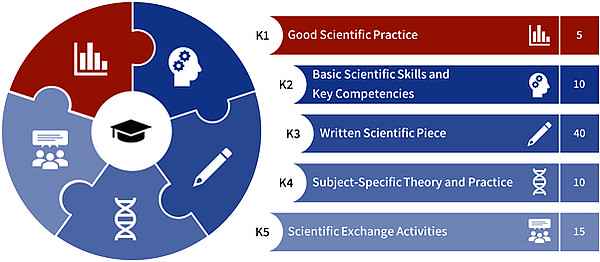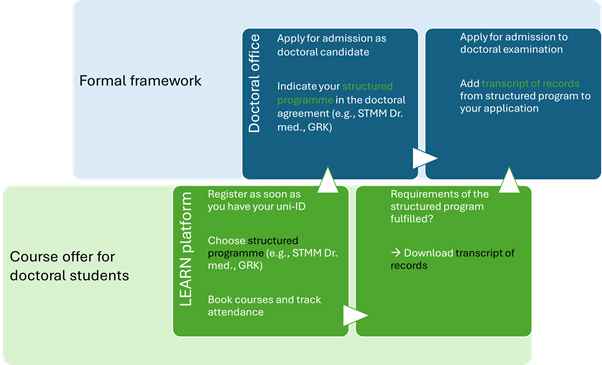You are here
Content
Current and future Dr. med. or Dr. med. dent. students can join the mailing list for the Dr. med. program through this link.
Information event on starting a doctorate
The STMM regularly organizes information sessions for medical students interested in pursuing a doctorate.
Duration and content:
30 minutes: overview of the doctoral program (STMM)
Topics: formalities (doctoral agreement, submission deadlines, doctoral scholarships, etc.) and content-related aspects (STMM course offerings, Moodle, LEARN, structured program, etc.)
30–60 minutes: Q&A with mentors
Some of our current doctoral candidates will share their experiences and insights regarding the doctorate and answer questions (e.g., how do I find a doctoral thesis and a supervisor, do I need a semester off, how can I fund my doctorate, and much more)
Next date: as announced in the STMM event calendar. Usually takes place at the start of each semester; more often if there is sufficient demand (>20 registrations).
Please register using this link.
Call for mentors: Doctoral candidates wanted
Dear Doctoral Candidates,
Starting in the winter semester 2024/25, we are establishing a mentoring program as part of the new structured Dr. med. doctoral program. To support this initiative, we are regularly seeking enthusiastic mentors who have already begun their doctoral projects.
As a mentor, you will assist the STMM Dr. med. coordinator with academic advising related to the doctoral journey. The mentoring group should represent all fields (clinical, experimental, theoretical).
What does being a mentor involve?
- Participating in one or more information sessions for prospective doctoral candidates (held at least four times a year).
- Acting as a point of contact for content-related and organizational questions about starting a doctorate (e.g., types of doctoral projects, supervisor selection, semester leave, courses, scholarships, etc.) and sharing your experiences and insights with prospective doctoral candidates.
- Collaborating with other mentors and the STMM office, gathering recurrent questions, and forwarding them to the STMM office to help develop an FAQ.
Interested?
We would be delighted to receive a short description about you, your doctoral project, and any doctoral scholarships you may have received.
Applications can be sent directly to stmm@medma.uni-heidelberg.de with the subject line “Mentorship”.
Application Deadline: Ongoing
New doctoral program for Dr. med. or Dr. med. dent.
On June 19th, 2024, the Faculty Council passed new guidelines for a mandatory structured doctoral program for Dr. med. or Dr. med. dent., which will complement the doctoral regulations starting in the summer semester of 2025 (01.04.2025). The aim of the structured program is to support young researchers through a structured and tailored scientific education as part of their doctoral studies in medicine and dentistry.
All doctoral candidates for Dr. med. or Dr. med. dent. at the Medical Faculty Mannheim who submit their request for acceptance as a doctoral student after these guidelines come into effect (01.04.2025) must participate in the curriculum of the structured program. The content and execution of the study program will be regulated by the doctoral committee (‘Promotionsausschuss’).
For information about requirements, registration, and other details about the doctoral program, the Doctoral office (‘Promotionsbüro’ – pages in German) is responsible, while the structured program’s content is overseen by the STMM (or for students registered in a graduate school (‘GRK’), the relevant graduate school office).
Guidelines and curriculum for the Dr. med. or Dr. med. dent. doctoral program
The curriculum is based on the scientific track of the medical curriculum MaReCuM and consists of a minimum of 80 hours distributed across five categories. Students must meet the minimum required hours in each category to be eligible for the doctoral examination. Additionally, students may voluntarily establish a Thesis Advisory Committee (TAC) with their supervisor (please see Guidelines on organising a TAC).
The course offer is accessible through Moodle.

Details on the categories:
K1. Good Scientific Practice: 5 hours
Examples of relevant content: rights and obligations of doctoral candidates from the perspective of good scientific practice, project design (controls, randomization, statistics), data management and security, ethics (human & animal), publishing ethics (authorship, data selection, etc.), data protection.
K2. Basic Scientific Skills and Key Competencies: 10 hours
Examples: presenting (poster and oral presentations), literature research, critical reading of academic literature, scientific writing, conflict and time management, project planning, career planning.
K3. A written scientific piece in the form of a research article/original paper, systematic review, ethics application, (DFG) research grant application, or animal experiment application: 40 hours.
K4. Subject-Specific Theory and Practice: 10 hours
Examples: basic statistics and guidelines, data analysis, laboratory and methods courses, basics of clinical trials, lab exchange, innovation, and entrepreneurship.
K5. Scientific Exchange Activities: 15 hours, divided into
- Passive participation within one's research group and active presentation of scientific data within one's research group: 10 hours.
Examples: research group seminar, literature seminar, TAC presentation.
- Passive and/or active participation outside one's research group: 5 hours.
Examples: participation in scientific lectures (e.g., Grant Rounds and other faculty seminars), conferences, science day, etc.
Tracking Achievements
Activities within the structured Dr. med. or Dr. med. dent. program will be submitted online through the STMM IT platform LEARN. LEARN documents the successful completion of the doctoral program by generating a transcript of records, which must be submitted when applying for the doctoral examination.
Registration on LEARN for the structured Dr. med. program is independent of official acceptance into the doctoral program. Students interested in pursuing a doctorate can register on LEARN even before submitting their application for acceptance and can book or have activities recognized. Once the acceptance into the doctoral program is finalized, data from heiDOCs will be synchronized with LEARN.
We recommend attending events and courses across all categories that are beneficial for your doctoral project and scientific development. However, the doctoral committee also permits the recognition of MaReCuM content (see list – in German) within categories 2 to 5. To have these activities recognized, the relevant certificates or partial certificates must be uploaded to LEARN as proof.
External achievements acquired during previous studies can be recognized by submitting a written request. The doctoral committee (‘Promotionsausschuss’) decides on the recognition of the respective competency.
Doctoral Agreement
The form of the structured doctoral program must be defined in the doctoral agreement (‘Promotionsvereinbarung’) and approved by the doctoral committee (‘Promotionsausschuss’). For doctoral candidates involved in a graduate school (‘GRK’), participation in the structured educational offerings of that graduate school usually suffices to meet the requirements of the Dr. med. curriculum. These candidates will specify the graduate school in the doctoral agreement. For all other candidates, the School of Translational Medicine provides the structured doctoral program from 01.04.2025 onwards, and these candidates will indicate the STMM Dr. med. program in the doctoral agreement.
Further Information and Contacts
Context Column

School of Translational Medicine (STMM)
Medical Faculty Mannheim,
Heidelberg University
Tridomus C, Ebene 3
Ludolf-Krehl-Straße 13-17
68167 Mannheim
Contact
STMM office
stmm@medma.uni-heidelberg.de
Dr. Susanne Hausselt
Management
Dr. sc. hum. programme
Phone +49 621 383-71597
Dr. Claudine Öngen
Dr. med. programme
Telefon 0621 383-71608
Ramona Ludwig
Administration + LEARN
Phone +49 621 383-71609
Mailing lists
Subscribe to one of our mailing lists:
Doctoral students enrolled in Mannheim for

